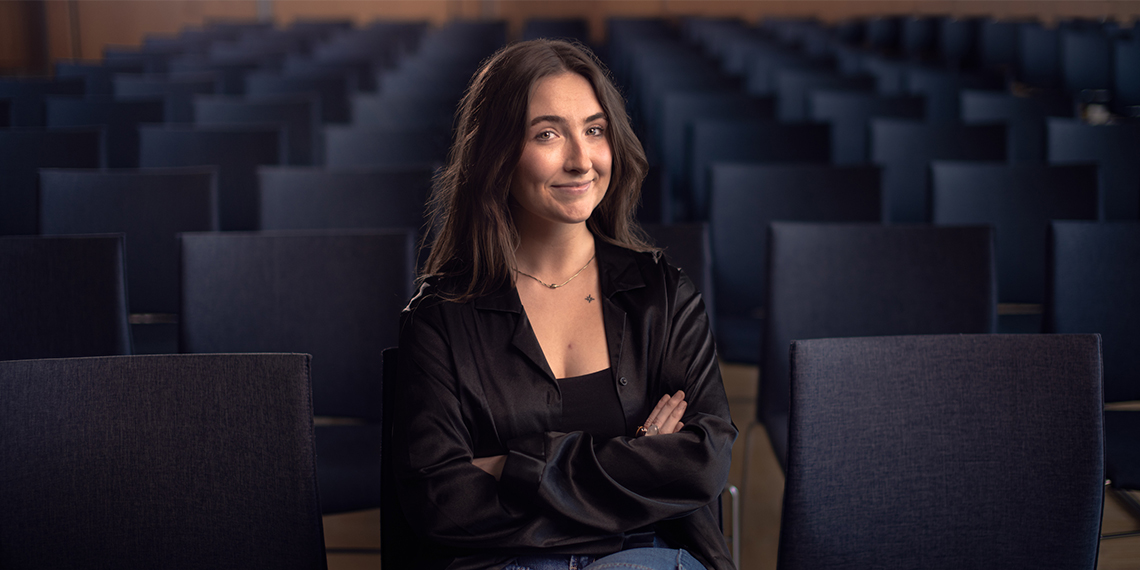Development of a Debater
Avalyn Renee ('23), exceptional student, exceptional person, exceptional debater

It was middle-school teacher who set Avalyn Renee (’23) on her path to debate stardom. With high recommendations, she started debate during her first year at Centennial High School in Boise, Idaho, where senior team members took her under their wings, helped her build a solid foundation through after-school coaching, and encouraged her to compete in the Lincoln-Douglas debate format, a one-on-one style common in high schools.
Sophomore year of high school was another development opportunity. Most schools have more than two competing Lincoln-Douglas (LD) debaters because of how research-intensive it is. Renee and the other debater had their work cut out for them.
By senior year, Renee was doing well as the only LD debater on her team, and her success caught the eye of 91³Ô¹ÏÍø’s debate director, Glen Frappier, who recruited Renee to GU.
In her final semester at GU, Renee competes in policy debate — a program that compares to D-I athletics in terms of workload. Policy debate can take up to 40 hours of research a week, plus practice every Monday, Wednesday and Friday for at least four hours throughout the season, which can last a whole academic year.
Policy debaters are compensated with an academic scholarship for their work. Monetary support has been critical for Renee, providing her with funding and a work-study job that she says has made it easier to do the things she loves.
Though Renee flailed upon beginning collegiate debate, she eagerly received feedback from judges and incorporated it into as much as she could. Sophomore year, her hard work started paying off. Her favorite topic focused on whether the United States should decrease its mutual defense pacts with NATO, Japan, the Philippines and/or South Korea. She dove deep into her interests , like geopolitics, international relations and critical theory.
Renee and debate partner Molly Martin (they/them) competed for three years together before Martin graduated in the spring. During a competitive junior year, the duo placed within the top 30 teams in the country. Martin is now pursuing a doctorate in communication with a concentration in disability studies at the University of Pittsburgh.
Renee took a leave of absence from GU last semester to work as a debate coach, but stayed in Spokane. She coaches elementary and middle school debate online and works as director of sales for DebateAble, a company that sells debate curriculum to elementary schools.
“Coaching debate is equally, if not more fulfilling, especially at this age level because of the skills and tools that debate provides,” Renee says. “Debate is a boot camp for critical thinking and learning about the world.”
Debate requires intimate knowledge of critical scholarship, theory, logic structures and good argumentation to win. Renee compares debate to chess as an innately competitive game requiring the right strategic moves to win.
“I wouldn’t be dramatic to say that debate has really shaped me into who I am and has provided me with so many opportunities that I wouldn’t have had otherwise,” Renee says. “It’s such a demanding activity that it really has forced me to show up and have a work ethic — otherwise, I probably wouldn’t be doing things like this.”
This year, Renee is debating finding her footing with her new partner, first-year Kaelyn Wellman (she/they). The duo qualified for the National Debate Tournament held March 25-27 in Washington D.C.
Outside of debate, Renee does research on enactivism with philosophy professor Charles Lassiter. She is also published in a textbook called “Why People Hate,” about how to combat white supremacy. She wrote a section on how we can reduce white supremacist organizing and recruitment using case studies she did on Patriot Front and different Aryan nation groups with the 91³Ô¹ÏÍø Center for the Study of Hate. Combating white supremacy is a topic Renee is especially passionate about, leading to her interest in researching how they use objects to recruit new members.
Debate cemented Renee’s goal of becoming a philosophy professor, within which she wants to focus on philosophy of art. Renee says that debate has provided teasers of life in an academic atmosphere and that she is willing to deal with the drawbacks to pursue that dream.
“I don’t think I valorize debate in any way but I love it regardless, and I think that I feel similarly towards academia,” Renee says.
Academics aside, at the heart of Renee’s love for debate is the people.
“[Debate has] provided me with great friends,” Renee said. “The debate community is just so eclectic and so smart. It is so fun to engage with people who have such depth of opinion and I just love talking with them.”
- Academics
- Service & Community Impact




